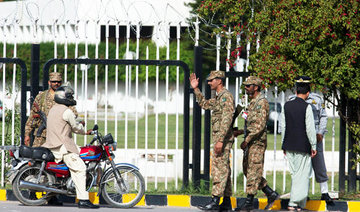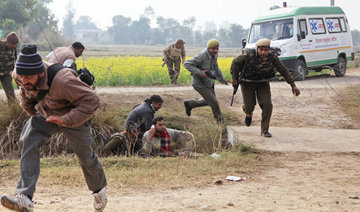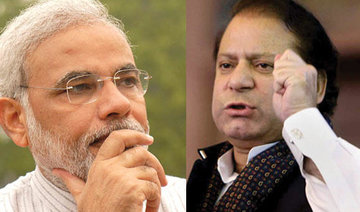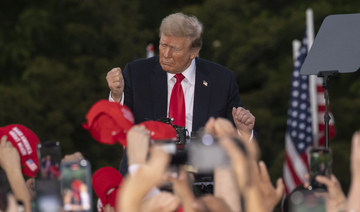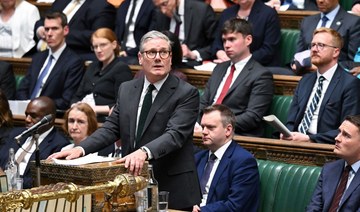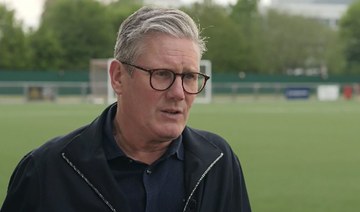NEW DELHI: This month marks 70 years since British India split into two nations — Hindu-majority India and Muslim-majority Pakistan — and millions were uprooted in one of the largest mass migrations in history.
An untold number of people — some estimates say up two million — died in the savage violence that followed, as Hindus and Muslims fleeing for their new homelands turned on one another, raping and butchering in genocidal retribution.
Five people who witnessed that bloody division told AFP of their fear, losses and attempts to rebuild their lives.
Nisar Akhtar, now a retired statistician in Karachi, was six years old when the smoke began to rise every night from the villages surrounding his family’s home in Hoshiarpur district in Punjab state — Sikhs, his father said, burning the surrounding areas.
Every day from that moment on they “faced the fear of being or not being.”
Eventually, after one failed escape attempt which saw his father separated from his family, they managed to flee to a refugee camp before beginning a 21-day walk into Pakistan, which was when the real nightmare began.
Sikhs attacked their caravan of several thousand people repeatedly. “They would toss the children in the air with their spears.
“I saw infants, children, and elders with spears pierced in their bodies. They were moaning with pain and I passed, skipping them.
“What could I have done? People were reeling in pain and shouting for water and we were too insensitive to help them. Everybody was concerned with his own life.”
He clung to his mother’s shirt so as not to lose her. She was also carrying his newborn sister. “At one stage, I am not sure whether knowingly or inadvertently, she left the baby lying on the ground. I asked her, ‘Where is my sister?’ ‘I don’t know,’ she flatly replied... I went back and I saw her (the baby) lying on the ground and picked her up. Today she is alive with the grace of Allah.”
Madhu Sondhi was five years old and living in Lahore when partition came and the Indian railway company offered her engineer father a choice of moving to India or staying in what is now Pakistan. The family ended up in a house near New Delhi’s central railway station that became a refuge for relatives streaming across the new border bringing horror stories.
“Opposite our house was a mosque where they were slaughtering Muslims. The bullets often fell in our garden so I was not allowed to play there.
“I wasn’t directly affected as I was very young. My mother’s sister, however, saw people being killed at the railway station, they were shoving pencils up their nostrils and into their eyes. She was never the same. One day she had one of her fits and picked me up, swung me around and threw me on the floor. My parents never left me alone with her again.”
“My mother’s brother stayed behind on his farm. As the rioters came looking for Hindus to kill, his Muslim servants hid him in a small shed and covered him with cow dung cakes. They loaded him onto a horse cart and set off to the refugee camp. On his way out he gave them his house keys — it’s yours, you saved my life, he told them.”
Raj Khanna was 14 years old, the third of seven children of a government accountant, living in a Hindu district of Lahore in 1947 when the killings mounted.
By summer of that year, an occasional stabbing had turned into a spree of killings and mobs attacks. “Rioters set fire to some of the houses in our lane,” he said.
“My friends and I had gone to see, and to help in any way. We were on the rooftop of the building next door, throwing water to douse the flames when someone pulled me back. That saved my life. There was a police wallah on the street firing at us. The bullet just missed me.”
“When our neighborhood went up in flames, that’s when the parents got scared and the exodus started.” The Khanna family went to Shimla, now the capital of India’s Himachal Pradesh state.
Raj Khanna eventually moved to Delhi. “I still had the refugee tag. The refugee tag stays with us. The wounds never heal.”
Saleem Hasan Siddiqui, now 76, vividly remembers the bloodied streets of old Delhi where the stench of chopped bodies wafted through the streets and frenzied mobs dumped corpses.
“The general atmosphere had become one of distrust, of fear. No one was ready to place their faith in one another,” said Siddiqui, who was first interviewed by the 1947 Partition Archive, an Indian organization that finds witnesses from that time and records their stories.
“We didn’t know who they were going to come for next.”
He recalled that as a six-year-old, he was frightened and fascinated by the violence.
“We weren’t allowed to go out much. But we would race out every opportunity we got because everyday it was ‘oh, that guy’s chopped head was found on the road’ or ‘oh, that guy was found murdered in the alley’. We were naturally excited.”
“They chopped people up and tossed them into the dry canal. Everyone was in a frenzy, killed whoever they saw... Hindu, Muslim, anyone. No one was really spared.”
Siddiqui recalled that he would run home “with chills.”
“The things I’ve seen, the things I’ve heard, they have stuck. They have forever been etched into my mind.”
Saeed Hasan Khan was 17 years old, trapped in east Punjab in September of 1947 as the killing continued. He managed to hitch a ride with a friend on a special train carrying the Pakistan army over the border.
The scenery outside the window was grotesque: “Corpses all around... We saw bodies at Jalandhar Station, Amritsar we saw the bodies, and we saw them at Ambala... There was nothing in my mind except being shocked.”
He made it over the border safely, attending college in Lahore before moving to Europe for 50 years and making several documentaries with the BBC, then ending up in Karachi.
But what stood out for him was when Pakistan played India in a Test match in 1954, just seven or so years after Partition.
Pakistan threw open the floodgates, allowing fans from Amritsar and Jalandhar to attend without visas.
In Lahore, he said, every other household had suffered some tragedy or horror during Partition. “But they all forgot all those miseries. When they saw Punjabi Hindus and Sikhs here, the sweetmeat shop owner refused to take money from them... They showed immense hospitality.
“And when they (Pakistanis) went to Jalandhar and Amritsar, the people there reciprocated.
“It means that a common man is ready to forget and forgive, despite that all the things were quite recent and alive in the memories of the people.”
India-Pakistan: Voices of the Partition
India-Pakistan: Voices of the Partition

Nikki Haley writes ‘finish them’ on Israeli shell: lawmaker

WASHINGTON: Former US presidential hopeful Nikki Haley has been photographed writing “Finish Them” on an Israeli shell as she toured sites near the northern border with Lebanon.
The photograph was posted on X on Tuesday by Danny Danon, a member of the Israeli parliament and former ambassador to the United Nations, who was accompanying Haley on her visit.
“’Finish Them’. This is what my friend the former ambassador Nikki Haley wrote,” Danon said in his post that showed a kneeling Haley writing on a shell with a purple marker pen.
Haley was a hawkish UN envoy under Donald Trump, and her term overlapped with Danon.
The Gaza war was sparked by Hamas’s October 7 attack on southern Israel, which resulted in the deaths of 1,189 people, mostly civilians, according to an AFP tally based on the latest Israeli official figures.
Militants also took 252 hostages, 121 of whom remain in Gaza, including 37 the army says are dead.
Israel’s retaliatory offensive has killed at least 36,096 people in Gaza, mostly civilians, according to the territory’s health ministry.
Haley, 52, abandoned her White House bid in March after heavy defeats in Republican primary contests to Trump, and last week said that she would vote for him in the election.
Trump has ruled her out of contention to be his vice president, but she is a potential presidential runner in 2028.
The White House said Tuesday that President Joe Biden has no plans to change his Israel policy following a deadly weekend strike on Rafah but that he is not turning a “blind eye” to the plight of Palestinian civilians.
White House says still opposes Ukraine using US arms against Russia

WASHINGTON: The White House on Tuesday rejected Ukrainian President Volodymyr Zelensky’s pleas for an end to restrictions on Kyiv using US-supplied arms to strike Russian territory.
“There’s no change to our policy at this point. We don’t encourage or enable the use of US-supplied weapons to strike inside Russia,” National Security Council spokesman John Kirby told a briefing.
Prosecutor urges jury to convict Trump, citing ‘powerful evidence’

NEW YORK: Donald Trump engaged in “conspiracy and a cover-up” to hide from voters that he had paid hush money to a porn star, prosecutors told a jury Tuesday in closing arguments at the first ever criminal trial of a former US president.
Less than six months before an election in which Trump is seeking to return to the White House, the stakes riding on the verdict are high — both for the 77-year-old personally and for the country.
Trump is accused of falsifying business records to reimburse his ex-lawyer Michael Cohen for a $130,000 payment to adult film actress Stormy Daniels, afraid that her account of an alleged sexual encounter could doom his 2016 presidential campaign against Hillary Clinton.
Assistant District Attorney Joshua Steinglass delivered the summation for the prosecution after Trump’s defense lawyer, Todd Blanche, called for his acquittal, insisting the case against the former president was based on lies.
Steinglass said Daniels’s story about her 2006 tryst with the married Trump was the motive for the alleged crime, but the “case at its core is about a conspiracy and a cover up” on the eve of an election.
“The people have presented powerful evidence of the defendant’s guilt,” he said.
Blanche told the jury that Trump was “innocent.” The only outcome should be a “very quick and easy not guilty verdict.”
Cohen, the one-time Trump fixer who became the star prosecution witness, was motivated by “outright hatred” for his former boss, Blanche said.
“He told you a number of things on that witness stand that were lies, pure and simple,” he said.
Blanche said Trump was busy “running the country” when the reimbursements were made to Cohen and he did not closely inspect all the invoices that came across his desk.
“There was no intent to defraud and beyond that there was no conspiracy to influence the 2016 election,” Blanche said.
But Steinglass countered that there was a mountain of corroborating evidence in addition to Cohen’s testimony.
“They want to make this case about Michael Cohen,” he said. “This case is about Donald Trump and whether he should be accountable for causing false entries in his own business records and whether he did that to cover up his own election violations.”
Speaking to reporters before entering the Manhattan courtroom, Trump called it a “very dangerous day for America.”
“We have a rigged court case that should have never been brought,” he said as three of his five children — Don Jr, Eric and Tiffany — stood behind him.
The 12 anonymous jurors were to start deliberations as early as Wednesday.
Polls show Trump neck and neck against President Joe Biden and the verdict will inject new tension into the White House race.
Speaking on behalf of the Biden campaign outside court, legendary actor Robert De Niro berated Trump as a “clown” intent on destroying the country.
The first former or sitting president under criminal indictment, Trump faces charges ranging from the relatively minor hush money case to accusations he took top secret documents and tried to overthrow the 2020 election.
The New York case, which featured more than 20 witnesses over five weeks and gripping testimony by Daniels and Cohen, is the only one likely to come to trial by election day.
If convicted, Trump faces up to four years in prison on each of 34 counts, but legal experts say that as a first-time offender he is unlikely to get jail time.
A conviction would not bar him from appearing on the ballot in November.
Trump chose not to testify in his defense.
Instead, he used his trips to court to stage tirades against “corrupt” Judge Juan Merchan, and to claim the trial is a Democratic ploy to keep him off the campaign trail.
To return a guilty or not guilty verdict requires the jury to be unanimous. Just one holdout means a hung jury and a mistrial, although prosecutors could seek a new trial.
Biden’s blurred red lines under scrutiny after Rafah carnage

WASHINGTON: Joe Biden’s red lines over Israel’s assault on Rafah have kept shifting, but the US president faces growing pressure to take a firmer stance after a deadly strike in the Gazan city.
Despite global outrage over the attack in which 45 people were killed, the White House insisted on Tuesday that it did not believe Israel had launched the major operation that Biden has warned against.
John Kirby, the US National Security Council spokesman, said that Biden had been consistent and was not “moving the stick” on what defined an all-out military offensive by key ally Israel.
But Biden faces a difficult balancing act both domestically and internationally over Gaza, especially in a year when the 81-year-old Democrat is locked in an election battle with Donald Trump.
“Biden wants to appear tough on Rafah, and has really tried to be stern with (Israeli Prime Minister Benjamin) Netanyahu, but in an election year, his red lines are increasingly blurred,” Colin Clarke, director of research at the Soufan Group, told AFP.
“I think he’ll continue shifting those lines, ducking and weaving, largely in response to events on the ground.”
Facing US campus protests over his support for Israel, Biden said earlier this month that he would not supply Israel with weapons for a major military operation in Rafah, and he halted a shipment of bombs.
Yet he has since taken no action even as Israel has stepped up air attacks and, as of Tuesday, moved tanks into central Rafah.
Instead, the White House has largely retreated to arguing about what does, and does not, constitute an invasion.
National Security Adviser Jake Sullivan said last week there was “no mathematical formula” and said that “what we’re going to be looking at is whether there is a lot of death and destruction.”
At the White House on Tuesday, his colleague Kirby faced intense questioning over the Israeli strike, which sparked a fire at a displaced persons camp in which dozes of people burned to death.
Kirby said the deaths were “heartbreaking” and “horrific” but again said there would be no change in policy toward Israel.
“We have not seen them smash into Rafah,” he said.
“We have not seen them go in with large units, large numbers of troops, in columns and formations in some sort of coordinated maneuver against multiple targets on the ground.”
But internationally the pressure is growing on Biden, a self-described Zionist who has stuck by Netanyahu despite deep disagreements since the war began with the October 7 Hamas attack.
Questions are mounting over how long the United States can tolerate an Israeli assault on Rafah when the International Court of Justice — the UN’s top court, of which both the US and Israel are members — ordered it to stop.
Political pressure is also mounting on Biden at home.
Protests against his support for Israel have roiled university campuses across the United States, while many on the left wing of his Democratic Party also oppose his stance.
Republicans however have assailed Biden over what they say is his faltering support for Israel, with US House Speaker Mike Johnson inviting Netanyahu to address Congress.
“It is indeed a difficult balancing act,” Gordon Gray, a former US ambassador who is now a professor at George Washington University, told AFP.
“Threading the proverbial needle — as the Biden administration is apparently seeking to do — will only disappoint voters who feel strongly about the issue one way or another.”
Gray however said he believed Biden’s decades-old support for Israel meant he would unlikely change his position, saying he was a “rare politician who is acting out of genuine conviction rather than for his own electoral benefit.”
Deputy leader of UK’s Labour Party promises to fight to end Gaza’s suffering, in leaked video

- Labour, if elected, would recognize Palestinian statehood, says Angela Rayner
LONDON: Angela Rayner, the deputy leader of the UK’s Labour Party, has promised that her party will do everything in its power to ease the suffering in Gaza as it bids to regain Muslim voters’ support, a leaked video surfacing on social media has revealed.
The footage was first reported by the political blog Guido Fawkes, which claimed to have obtained the leaked tape from a meeting in Ashton-under-Lyne, Rayner’s constituency.
The MP is seen appealing to voters upset with the party’s stance on Israel’s assault on Gaza, The Telegraph reported.
Rayner — claiming she worked “day and night” to get three British doctors out of Rafah and is now attempting to secure aid for the enclave — said: “I promise you, the Labour Party, including myself, is doing everything we can, because nobody wants to see what’s happening.”
She acknowledged the party’s current inability to halt the fighting, admitting that Labour’s influence would be “limited,” even if it came to power after July’s general election.
Rayner added: “Only last week the Labour Party were supporting the ICC (International Criminal Court). The Conservatives didn’t support the ICC, so with this general election on that issue, we can’t affect anything when we’re not in government.
“And I’ll be honest with you, if Labour gets into government, we are limited. I will be honest. I’m not going to promise you … because (Joe) Biden, who’s the US (president), who has way more influence, has only got limited influence in that.
“And Qatar, Saudi Arabia, all of these people, we are all working to stop what’s happening at the moment; we want to see that. So I promise you, that’s what we want to see.”
Rayner also promised that, if Labour was elected, the party would recognize Palestinian statehood.
She added: “If Labour gets into power, we will recognize Palestine. I will push not only to recognize … there is nothing to recognize at the moment, sadly. It’s decimated.
“We have to rebuild Palestine; we have to rebuild Gaza. That takes more than just recognizing it.”
Gaza has been a divisive issue for Labour since Oct. 7, with reports revealing that Muslim voters have abandoned the party as a result of what they perceive as its politicians enabling the war.
The Telegraph found that Labour’s support had dropped in local elections in areas with large Muslim populations, including Oldham in Greater Manchester, where the party lost control of the council in a surprise defeat.
Labour leader Keir Starmer has expressed his determination to re-establish trust among those who have abandoned his party due to his handling of the Gaza war.
However, when probed on particular commitments, he remained vague.
Rayner said in the video: “I know that people are angry about what’s happening in the Middle East.
“If my resignation as an MP now would bring a ceasefire, I would do it. I would do it if I could effect change.”
However, she said such an eventuality was not “in my gift” due to the “failure of the international community.”
In response to the footage, Nigel Farage, Reform UK’s honorary president, accused Rayner of “begging” for the Muslim vote, The Telegraph reported.



